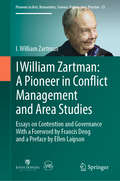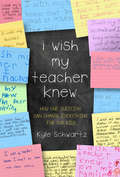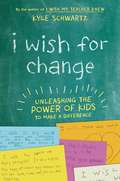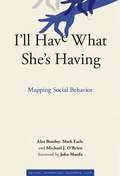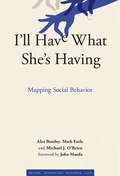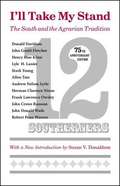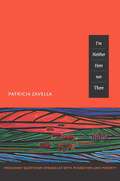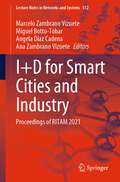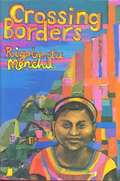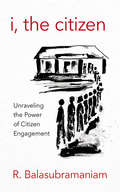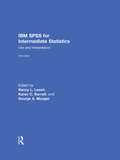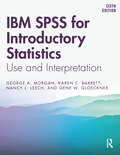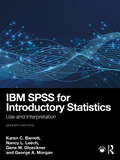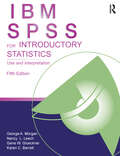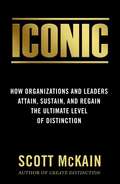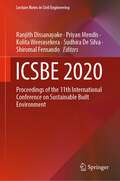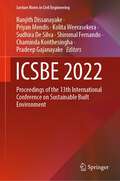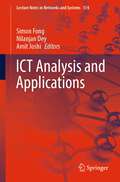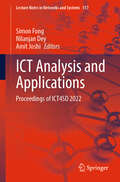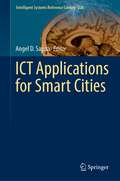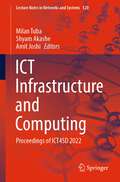- Table View
- List View
I William Zartman: Essays on Contention and Governance (Pioneers in Arts, Humanities, Science, Engineering, Practice #23)
by I. William ZartmanThe work draws on wide-ranging area analysis to develop inductively new concepts and approaches for further use in explanation and application. Divided into two parts, it begins with analysis of revolution and socio-political unrest, followed by models of ethnic conflict and elite circulation in developing societies. It presents the cultural dialectic present in Islam. It then lays out the patterns of mediation and negotiation in managing and resolving conflict, culminating with an analysis of intractables. Part two on governance lays out the nature of world order, cooperation, and conciliation. It then turns to the challenges of identity, ideology, and interest, with some specific attention to the nature of borders and borderlands, and focuses on governance as conflict management and as negotiation. - This book encompasses a new analysis of a neglected part of International Relation, the prevention and management of conflict.- The book confronts sources and patterns of contentious politics with systems and methods of governance.- The book lays out a comprehensive conceptualization of the process of conflict management and negotiation, including questions of when as well as how.
I Wish My Teacher Knew: How One Question Can Change Everything for Our Kids
by Kyle SchwartzOne day, third-grade teacher Kyle Schwartz asked her students to fill-in-the-blank in this sentence: "I wish my teacher knew _____.” The results astounded her. Some answers were humorous, others were heartbreaking-all were profoundly moving and enlightening. The results opened her eyes to the need for educators to understand the unique realities their students face in order to create an open, safe and supportive place in the classroom. When Schwartz shared her experience online, #IWishMyTeacherKnew became an immediate worldwide viral phenomenon. Schwartz's book tells the story of #IWishMyTeacherKnew, including many students' emotional and insightful responses, and ultimately provides an invaluable guide for teachers, parents, and communities.
I Wish for Change: Unleashing the Power of Kids to Make a Difference
by Kyle SchwartzFrom the author of I Wish My Teacher Knew, how grownups can empower children to stand up for what they believe inThird-grade teacher Kyle Schwartz often tells her students: "You are not here so you can make money in a decade. You are here so you can make a difference now."Young people are up for the task. In the face of school shootings, cyber bullying, and other challenges students face at school, there are students who are changing the world right now.In I Wish for Change, teacher and author Kyle Schwartz equips both teachers and parents to help children stand up for what they believe is right and make value-driven decisions. She shows how children's adaptability, vulnerability, and empathy make them excellent agents for change, as well as how to teach children about the mechanics and structures of power so they can effectively change them.Filled with inspiring stories from Kyle's students and educators around the nation, as well as practical, replicable strategies for the classroom, I Wish for Change is the guide for every teacher, educator, and parent to show kids that their voice matters.
I'd Rather Be in Charge
by Charlotte BeersCharlotte Beers is proof that women can achieve power, pride, and joy at work—despite the odds. In the highly competitive and often cutthroat world of advertising, Charlotte became the first female ever to head two giant, multinational advertising agencies. In serving her demanding clients, she helped build many of the most important brands around the world. Today, Charlotte rates her current title—teacher—her most satisfying, as she travels through the United States and Europe educating women on how to ignite their own strengths, in what she calls “the era of forging ahead for women. ” Her pioneering experiences have been captured inI’d Rather Be in Charge, creating a blueprint for women as they face their own challenges and strive to achieve the positions of leadership and influence they deserve. Told in an intimate and honest style,I’d Rather Be in Chargeis part personal history, part pragmatic guide, as Charlotte describes her own experiences, lessons from her peers such as Martha Stewart and Suze Orman, as well as stories of her students’ transformations. By chronicling both successes and mistakes, Charlotte proves that finding your own personal style of leadership is the only way to take charge, find satisfaction, and gain confidence in the ever-evolving workplace of today. I’d Rather Be in Chargeis a breakthrough book. It is a master class for women who are ready to shatter their own glass ceilings.
I'd Rather Be in Charge
by Charlotte BeersCharlotte Beers is proof that women can achieve power, pride, and joy at work--despite the odds. In the highly competitive and often cutthroat world of advertising, Charlotte became the first female ever to head two giant, multinational advertising agencies. In serving her demanding clients, she helped build many of the most important brands around the world. Today, Charlotte rates her current title--teacher--her most satisfying, as she travels through the United States and Europe educating women on how to ignite their own strengths, in what she calls "the era of forging ahead for women." Her pioneering experiences have been captured in I'd Rather Be in Charge, creating a blueprint for women as they face their own challenges and strive to achieve the positions of leadership and influence they deserve. Told in an intimate and honest style, I'd Rather Be in Charge is part personal history, part pragmatic guide, as Charlotte describes her own experiences, lessons from her peers such as Martha Stewart and Suze Orman, as well as stories of her students' transformations. By chronicling both successes and mistakes, Charlotte proves that finding your own personal style of leadership is the only way to take charge, find satisfaction, and gain confidence in the ever-evolving workplace of today. I'd Rather Be in Charge is a breakthrough book. It is a master class for women who are ready to shatter their own glass ceilings.
I'll Have What She's Having
by Alex Bentley Mark Earls Michael J. O'BrienHumans are, first and foremost, social creatures. And this, according to the authors of I'll Have What She's Having, shapes--and explains--most of our choices. We're not just blindly driven by hard-wired instincts to hunt or gather or reproduce; our decisions are based on more than "nudges" exploiting individual cognitive quirks. I'll Have What She's Having shows us how we use the brains of others to think for us and as storage space for knowledge about the world. The story zooms out from the individual to small groups to the complexities of populations. It describes, among other things, how buzzwords propagate and how ideas spread; how the swine flu scare became an epidemic; and how focused social learning by a few gets amplified as copying by the masses. It describes how ideas, behavior, and culture spread through the simple means of doing what others do. It is notoriously difficult to change behavior. For every "Yes We Can" political slogan, there are thousands of "Just Say No" buttons. I'll Have What She's Having offers a practical map to help us navigate the complex world of social behavior, an essential guide for anyone who wants to understand how people behave and how to begin to change things.
I'll Have What She's Having: Mapping Social Behavior (Simplicity: Design, Technology, Business, Life)
by Mark Earls Michael J. O'Brien R. Alexander BentleyHow we learn from those around us: an essential guide to understanding how people behave.Humans are, first and foremost, social creatures. And this, according to the authors of I'll Have What She's Having, shapes—and explains—most of our choices. We're not just blindly driven by hard-wired instincts to hunt or gather or reproduce; our decisions are based on more than “nudges” exploiting individual cognitive quirks.I'll Have What She's Having shows us how we use the brains of others to think for us and as storage space for knowledge about the world. The story zooms out from the individual to small groups to the complexities of populations. It describes, among other things, how buzzwords propagate and how ideas spread; how the swine flu scare became an epidemic; and how focused social learning by a few gets amplified as copying by the masses. It describes how ideas, behavior, and culture spread through the simple means of doing what others do.It is notoriously difficult to change behavior. For every “Yes We Can” political slogan, there are thousands of “Just Say No” buttons. I'll Have What She's Having offers a practical map to help us navigate the complex world of social behavior, an essential guide for anyone who wants to understand how people behave and how to begin to change things.
I'll Take My Stand: The South and the Agrarian Tradition (Library of Southern Civilization)
by Robert Penn Warren Allen Tate Donald Davidson John Gould Fletcher John Crowe Ransom Susan V. Donaldson Henry Blue Kline Lyle H. Lanier Stark Young Andrew Nelson Lytle Herman Clarence Nixon Frank Lawrence Owsley John Donald WadeFirst published in 1930, the essays in this manifesto constitute one of the outstanding cultural documents in the history of the South. In it, twelve southerners-Donald Davidson, John Gould Fletcher, Henry Blue Kline, Lyle H. Lanier, Stark Young, Allen Tate, Andrew Nelson Lytle, Herman Clarence Nixon, Frank Lawrence Owsley, John Crowe Ransom, John Donald Wade, and Robert Penn Warren-defended individualism against the trend of baseless conformity in an increasingly mechanized and dehumanized society. In her new introduction, Susan V. Donaldson shows that the Southern Agrarians might have ultimately failed in their efforts to revive the South they saw as traditional, stable, and unified, but they nonetheless sparked debates and quarrels about history, literature, race, gender, and regional identity that are still being waged today over Confederate flags, monuments, slavery, and public memory.
I'm Afraid Debbie from Marketing Has Left for the Day: How to Use Behavioural Design to Create Change in the Real World
by Morten MünsterHow to Use Behavioural Design to Create Change in the Real WorldIn this ground-breaking book, author Morten Münster presents a set of rules that individuals and companies can follow to bring about necessary change.Using behavioural design and an accessible four-step method, he shows how people can be persuaded to do one thing instead of another and thereby achieve success.By examining an array of examples drawn from business, government, various public groups and institutions he demonstrates how the rules can be learned and applied in different contexts.
I'm Afraid Debbie from Marketing Has Left for the Day: How to Use Behavioural Design to Create Change in the Real World
by Morten MünsterHow to Use Behavioural Design to Create Change in the Real WorldIn this ground-breaking book, author Morten Münster presents a set of rules that individuals and companies can follow to bring about necessary change.Using behavioural design and an accessible four-step method, he shows how people can be persuaded to do one thing instead of another and thereby achieve success.By examining an array of examples drawn from business, government, various public groups and institutions he demonstrates how the rules can be learned and applied in different contexts.
I'm Neither Here Nor There: Mexicans' Quotidian Struggles with Migration and Poverty
by Patricia ZavellaI'm Neither Here nor There explores how immigration influences the construction of family, identity, and community among Mexican Americans and migrants from Mexico. Based on long-term ethnographic research, Patricia Zavella describes how poor and working-class Mexican Americans and migrants to California's central coast struggle for agency amid the region's deteriorating economic conditions and the rise of racial nativism in the United States. Zavella also examines tensions within the Mexican diaspora based on differences in legal status, generation, gender, sexuality, and language. She proposes "peripheral vision" to describe the sense of displacement and instability felt by Mexican Americans and Mexicans who migrate to the United States as well as by their family members in Mexico. Drawing on close interactions with Mexicans on both sides of the border, Zavella examines migrant journeys to and within the United States, gendered racialization, and exploitation at workplaces, and the challenges that migrants face in forming and maintaining families. As she demonstrates, the desires of migrants to express their identities publicly and to establish a sense of cultural memory are realized partly through Latin American and Chicano protest music, and Mexican and indigenous folks songs played by musicians and cultural activists.
I+D for Smart Cities and Industry: Proceedings of RITAM 2021 (Lecture Notes in Networks and Systems #512)
by Miguel Botto-Tobar Marcelo Zambrano Vizuete Angela Diaz Cadena Ana Zambrano VizueteThis book presents the proceedings of the Second International Conference on Technological Research - RITAM 2021. RITAM 2021 was held on October 27–29, 2021. It was jointly supported and co-organized by the RITAM Research Network (Sucre, Central Técnico, Turismo y Patrimonio YAVIRAC, Luis Napoleón Dillon, Conservatorio Superior Nacional de Música, Luis A Martínez, Paulo Emilio Macías, La Maná, Luis A Martínez Agronómico Loja, Primero de Mayo, Jaime Roldós Aguilera, Cotacachi, Alfonso Herrera) and GDEON. RITAM aims to provide a forum for discussion and the dissemination of results from R&D projects that have been developed both within and outside of Ecuador over the last few years.
I, Rigoberta Menchu: An Indian Woman in Guatemala
by Rigoberta MenchuA memoir of a woman born in the mountains of Guatemala into the Quiche people. A discussion of her life and the civil war in Guatemala
I, the Citizen: Unraveling the Power of Citizen Engagement
by R. BalasubramaniamI, the Citizen is an attempt to understand citizen development and engagement. R. Balasubramaniam takes the reader through interpretations of development initiatives at the grassroots and what good governance means to ordinary people. He unravels the power of citizen engagement through his experiences of leading civil society campaigns against corruption and towards strengthening democratic participation of people. I, the Citizen also deals with the philosophical underpinnings of public policies, drawing from his on-the-ground experience as well as engagement with those in the higher echelons of policymaking and implementation. The last section of the book provides glimpses into milestones of a development movement, which Balu founded and led, milestones that are responsible for a continued faith in citizen engagement despite the hindering forces.
IBM SPSS for Intermediate Statistics: Use and Interpretation, Fifth Edition
by George A. Morgan Nancy L. Leech Karen C. BarrettDesigned to help readers analyze and interpret research data using IBM SPSS, this user-friendly book shows readers how to choose the appropriate statistic based on the design; perform intermediate statistics, including multivariate statistics; interpret output; and write about the results. The book reviews research designs and how to assess the accuracy and reliability of data; how to determine whether data meet the assumptions of statistical tests; how to calculate and interpret effect sizes for intermediate statistics, including odds ratios for logistic analysis; how to compute and interpret post-hoc power; and an overview of basic statistics for those who need a review. Unique chapters on multilevel linear modeling; multivariate analysis of variance (MANOVA); assessing reliability of data; multiple imputation; mediation, moderation, and canonical correlation; and factor analysis are provided. SPSS syntax with output is included for those who prefer this format. The new edition features: * IBM SPSS version 22; although the book can be used with most older and newer versions * New discusiion of intraclass correlations (Ch. 3) * Expanded discussion of effect sizes that includes confidence intervals of effect sizes (ch.5) * New information on part and partial correlations and how they are interpreted and a new discussion on backward elimination, another useful multiple regression method (Ch. 6) * New chapter on how to use a variable as a mediator or a moderator (ch. 7) * Revised chapter on multilevel and hierarchical linear modeling (ch. 12) * A new chapter (ch. 13) on multiple imputation that demonstrates how to deal with missing data * Updated web resources for instructors including PowerPoint slides and answers to interpretation questions and extra problems and for students, data sets, chapter outlines, and study guides. IBM SPSS for Intermediate Statistics, Fifth Edition provides helpful teaching tools: * all of the key SPSS windows needed to perform the analyses * outputs with call-out boxes to highlight key points * interpretation sections and questions to help students better understand and interpret the output * extra problems with realistic data sets for practice using intermediate statistics * Appendices on how to get started with SPSS, write research questions, and basic statistics. An ideal supplement for courses in either intermediate/advanced statistics or research methods taught in departments of psychology, education, and other social, behavioral, and health sciences. This book is also appreciated by researchers in these areas looking for a handy reference for SPSS
IBM SPSS for Introductory Statistics: Use and Interpretation
by George A. Morgan Nancy L. Leech Karen C. Barrett Gene W. GloecknerIBM SPSS for Introductory Statistics is designed to help students learn how to analyze and interpret research. In easy-to-understand language, the authors show readers how to choose the appropriate statistic based on the design, and to interpret outputs appropriately. There is such a wide variety of options and statistics in SPSS, that knowing which ones to use and how to interpret the outputs can be difficult. This book assists students with these challenges. Comprehensive and user-friendly, the book prepares readers for each step in the research process: design, entering and checking data, testing assumptions, assessing reliability and validity, computing descriptive and inferential parametric and nonparametric statistics, and writing about results. Dialog windows and SPSS syntax, along with the output, are provided. Several realistic data sets, available online, are used to solve the chapter problems. This new edition includes updated screenshots and instructions for IBM SPSS 25, as well as updated pedagogy, such as callout boxes for each chapter indicating crucial elements of APA style and referencing outputs. IBM SPSS for Introductory Statistics is an invaluable supplemental (or lab text) book for students. In addition, this book and its companion, IBM SPSS for Intermediate Statistics, are useful as guides/reminders to faculty and professionals regarding the specific steps to take to use SPSS and/or how to use and interpret parts of SPSS with which they are unfamiliar.
IBM SPSS for Introductory Statistics: Use and Interpretation
by George A. Morgan Nancy L. Leech Karen C. Barrett Gene W. GloecknerIBM SPSS for Introductory Statistics is designed to help students learn how to analyze and interpret research. In easy-to-understand language, the authors show readers how to choose the appropriate statistic based on the design, and to interpret outputs appropriately. There is such a wide variety of options and statistics in SPSS that knowing which ones to use and how to interpret the outputs can be difficult. This book assists students with these challenges.Comprehensive and user-friendly, this book prepares readers for each step in the research process: design, entering and checking data, testing assumptions, assessing reliability and validity, computing descriptive and inferential parametric and nonparametric statistics, and writing about results. Dialog windows and SPSS syntax, along with the output, are provided. Several realistic data sets are used to solve the chapter problems and are available as an online resource.This edition includes the following:• Updated chapters and screenshots• Additional SPSS work problems• Callout boxes for each chapter, indicating crucial elements of APA style and referencing outputsIBM SPSS for Introductory Statistics is an invaluable supplemental (or lab text) book for students. In addition, this book and its companion, IBM SPSS for Intermediate Statistics, are useful as guides/reminders to faculty and professionals regarding the specific steps to take to use SPSS and/or how to use and interpret parts of SPSS with which they are unfamiliar.
IBM SPSS for Introductory Statistics: Use and Interpretation, Fifth Edition
by George A. Morgan Nancy L. Leech Karen C. Barrett Gene W. GloecknerDesigned to help students analyze and interpret research data using IBM SPSS, this user-friendly book, written in easy-to-understand language, shows readers how to choose the appropriate statistic based on the design, and to interpret outputs appropriately. The authors prepare readers for all of the steps in the research process: design, entering and checking data, testing assumptions, assessing reliability and validity, computing descriptive and inferential parametric and nonparametric statistics, and writing about outputs. Dialog windows and SPSS syntax, along with the output, are provided. Three realistic data sets, available on the Internet, are used to solve the chapter problems. The new edition features: Updated to IBM SPSS version 20 but the book can also be used with older and newer versions of SPSS. A new chapter (7) including an introduction to Cronbach’s alpha and factor analysis. Updated Web Resources with PowerPoint slides, additional activities/suggestions, and the answers to even-numbered interpretation questions for the instructors, and chapter study guides and outlines and extra SPSS problems for the students. The web resource is located www.routledge.com/9781848729827 . Students, instructors, and individual purchasers can access the data files to accompany the book at www.routledge.com/9781848729827 . IBM SPSS for Introductory Statistics, Fifth Edition provides helpful teaching tools: All of the key IBM SPSS windows needed to perform the analyses. Complete outputs with call-out boxes to highlight key points. Flowcharts and tables to help select appropriate statistics and interpret effect sizes. Interpretation sections and questions help students better understand and interpret the output. Assignments organized the way students proceed when they conduct a research project. Examples of how to write about outputs and make tables in APA format. Helpful appendices on how to get started with SPSS and write research questions. An ideal supplement for courses in either statistics, research methods, or any course in which SPSS is used, such as in departments of psychology, education, and other social and health sciences. This book is also appreciated by researchers interested in using SPSS for their data analysis.
ICONIC: How Organizations and Leaders Attain, Sustain, and Regain the Highest Level of Distinction
by Scott McKainScott McKain, award-winning speaker and author, explains how to move beyond being distinctive and to take your brand and business to the next level, to become iconic by knowing your customer and audience and providing the Ultimate Customer Experience every time. What if merely “standing out” from your competition isn’t enough to take your brand and business to the highest level? How do you become an iconic organization or leader? Being distinctive in the marketplace used to be the pinnacle of success. In today’s global marketplace, that mountain has become significantly more difficult to climb. And, with the explosion of social media, the competition for attention -- and customers -- is more intense than ever before. Standing out is not only more challenging than ever, it now has less of an impact on sustained growth. To be a lasting company, leader, or brand on a positive trajectory today, one must become iconic. In his new book, ICONIC, award-winning author and speaker Scott McKain examines what an iconic organization or leader is -- and helps you attain and retain that rare status. If your company has slipped in its standing (for example, think Sears or Nokia), McKain teaches you how you can regain your position. This is accomplished through unconventional ideas such as: • Go negative for greater success • Do not “under-promise/over-deliver” • Quit selling your products and services ICONIC is filled with insightful advice and practical examples. It’s not a book merely expressing an unproven, unrealistic theory. ICONIC teaches the critical, specific steps required to attain the highest level of distinction. Each chapter includes study questions to be used in company-wide or departmental focus groups to help you achieve iconic status. And, the examples used are not merely another recitation of praise for Starbucks, Apple, Google, Southwest, and Amazon. You will discover the only two factors upon which customers and employees judge your organization. You’ll meet and learn from the millionaire chimney sweep…the valet parking attendant building an iconic craft brewery…the single store steakhouse in the Midwest with higher revenue than New York City’s famed Tavern on the Green…and many more. ICONIC delivers powerful, practical, and precise steps for anyone from a Fortune 500 CEO to a solo-entrepreneur. From major industries to network marketing, there are critical insights awaiting you in ICONIC. The goal of this book is to is to help you and your organization achieve iconic status through sound research and practical wisdom. After reading ICONIC, you will be ready to take your business to the highest level.
ICSBE 2020: Proceedings of the 11th International Conference on Sustainable Built Environment (Lecture Notes in Civil Engineering #174)
by Ranjith Dissanayake Priyan Mendis Kolita Weerasekera Sudhira De Silva Shiromal FernandoThis book highlights the latest knowledge and innovations in the field of civil engineering and construction industry striving for a sustainable built environment. It includes recent innovative findings from the proceedings of the 11th ICSBE 2020 under the themes of sustainable tall buildings, sustainable bridge construction and maintenance, waste in construction industry, sustainable manufacturing and recycling, disaster risk reduction for sustainable built environment, green innovations and entrepreneurship, sustainable water management in developing countries, water pollution and CKDu, sustainable urban environment and social well-being, and many greener and sustainable resource and energy-efficient innovative research findings.
ICSBE 2022: Proceedings of the 13th International Conference on Sustainable Built Environment (Lecture Notes in Civil Engineering #362)
by Ranjith Dissanayake Priyan Mendis Kolita Weerasekera Sudhira De Silva Shiromal Fernando Chaminda Konthesingha Pradeep GajanayakeThis book highlights the latest knowledge and innovations in the fields of civil engineering and construction industry striving for a sustainable built environment. It consists of high quality and innovative research findings selected from the proceedings of the 13th ICSBE 2022 under the themes of sustainable construction, urban green infrastructure and planning, rainwater harvesting and water conservation, high-performance concrete, indoor environmental quality and indoor plants, wind and hydro-power energy, waste and wastewater management for enhanced sustainability, impacts of climate change, carbon footprint, global climate model and landscaping, material flows and industrial ecology, sustainable materials, etc.
ICT Analysis and Applications (Lecture Notes in Networks and Systems #314)
by Nilanjan Dey Amit Joshi Simon FongThis book proposes new technologies and discusses future solutions for ICT design infrastructures, as reflected in high-quality papers presented at the 6th International Conference on ICT for Sustainable Development (ICT4SD 2021), held in Goa, India, on 5–6 August 2021. The book covers the topics such as big data and data mining, data fusion, IoT programming toolkits and frameworks, green communication systems and network, use of ICT in smart cities, sensor networks and embedded system, network and information security, wireless and optical networks, security, trust, and privacy, routing and control protocols, cognitive radio and networks, and natural language processing. Bringing together experts from different countries, the book explores a range of central issues from an international perspective.
ICT Analysis and Applications: Proceedings of ICT4SD 2022 (Lecture Notes in Networks and Systems #517)
by Nilanjan Dey Amit Joshi Simon FongThis book proposes new technologies and discusses future solutions for ICT design infrastructures, as reflected in high-quality papers presented at the 7th International Conference on ICT for Sustainable Development (ICT4SD 2022), held in Goa, India, on July 29–30, 2022. The book covers the topics such as big data and data mining, data fusion, IoT programming toolkits and frameworks, green communication systems and network, use of ICT in smart cities, sensor networks and embedded system, network and information security, wireless and optical networks, security, trust, and privacy, routing and control protocols, cognitive radio and networks, and natural language processing. Bringing together experts from different countries, the book explores a range of central issues from an international perspective.
ICT Applications for Smart Cities (Intelligent Systems Reference Library #224)
by Angel D. SappaThis book is the result of four-year work in the framework of the Ibero-American Research Network TICs4CI funded by the CYTED program. In the following decades, 85% of the world's population is expected to live in cities; hence, urban centers should be prepared to provide smart solutions for problems ranging from video surveillance and intelligent mobility to the solid waste recycling processes, just to mention a few. More specifically, the book describes underlying technologies and practical implementations of several successful case studies of ICTs developed in the following smart city areas: • Urban environment monitoring • Intelligent mobility • Waste recycling processes • Video surveillance • Computer-aided diagnose in healthcare systems • Computer vision-based approaches for efficiency in production processes The book is intended for researchers and engineers in the field of ICTs for smart cities, as well as to anyone who wants to know about state-of-the-art approaches and challenges on this field.
ICT Infrastructure and Computing: Proceedings of ICT4SD 2022 (Lecture Notes in Networks and Systems #520)
by Amit Joshi Shyam Akashe Milan TubaThis book proposes new technologies and discusses future solutions for ICT design infrastructures, as reflected in high-quality papers presented at the 7th International Conference on ICT for Sustainable Development (ICT4SD 2022), held in Goa, India, on 29–30 July 2022. The book covers the topics such as big data and data mining, data fusion, IoT programming toolkits and frameworks, green communication systems and network, use of ICT in smart cities, sensor networks and embedded system, network and information security, wireless and optical networks, security, trust, and privacy, routing and control protocols, cognitive radio and networks, and natural language processing. Bringing together experts from different countries, the book explores a range of central issues from an international perspective.
